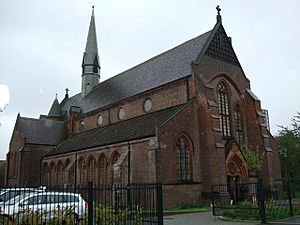St Clement's Church, Ordsall facts for kids
Quick facts for kids St Clement's Church, Ordsall |
|
|---|---|

St Clement's Church, Ordsall, from the northwest
|
|
| Lua error in Module:Location_map at line 420: attempt to index field 'wikibase' (a nil value). | |
| OS grid reference | SJ 818,973 |
| Location | Groves Avenue, Ordsall, Salford, Greater Manchester |
| Country | England |
| Denomination | Anglican |
| Website | St Clement, Ordsall |
| History | |
| Status | Parish church |
| Architecture | |
| Functional status | Active |
| Heritage designation | Grade II |
| Designated | 18 January 1980 |
| Architect(s) | Paley and Austin |
| Architectural type | Church |
| Style | Gothic Revival |
| Groundbreaking | 1877 |
| Completed | 1878 |
| Administration | |
| Parish | Ordall and Salford Quays |
| Deanery | Salford |
| Archdeaconry | Salford |
| Diocese | Manchester |
| Province | York |
St Clement's Church is an old and important church located in Ordsall, Salford, Greater Manchester, England. It's a special building because it's a Grade II listed building, which means it's protected for its history and architecture. This church is an active Anglican parish church, part of the Anglican Diocese of Manchester.
Contents
History of St Clement's Church
The church was built a long time ago, between 1877 and 1878. It was designed by famous architects named Paley and Austin from Lancaster. The building cost about £9,000 at that time. This amount would be worth a lot more money today!
The land for the church was a gift from Lord Egerton. He also paid for the church and the house for the priest. The church closed down in the 1980s. But it reopened its doors around 2005 and is still active today.
Location and Local Connections
St Clement's Church is on Groves Avenue, just off Hulton Street in Ordsall. You can even see it from the Eccles line of the Manchester Metrolink tram system.
The church has a fun connection to a famous TV show. It can be seen in the closing credits of Coronation Street. Also, a nearby street, St. Clement's Drive, was built where Archie Street used to be. Archie Street was the real-life inspiration for the fictional Coronation Street.
Architecture and Design
St Clement's Church is built from red brick and terracotta, which is a type of baked clay. It has a roof made of tiles. The church's design is in a style called 13th-century Gothic. This means it has features like pointed arches and tall windows, similar to churches built in the 1200s.
Church Layout and Features
The church has a long main area called a nave. This nave has seven sections, or "bays," and a clerestory, which is an upper level with windows. There's also a chancel (the area around the altar) and aisles on both the north and south sides.
Above the chancel, you can see a tall, slender spire-like structure called a flèche. It is covered with Westmorland slate. The outside walls have buttresses, which are supports that help hold the building up. Along the aisles, there are seven windows, each with three sections. The upper clerestory windows are round.
At the east end of the church, there's a large window with five sections. Above it, there's an arch and a triangular gable with three decorative, blind (not open) lancets. The west end of the church has a unique entrance, or portal. It's made of molded brick and has a round design in terracotta.
Inside the Church
Inside, the main arches that separate the nave from the aisles are supported by round sandstone pillars. The floor of the chancel is covered with special Doulton tiles. The walls of the chancel also have beautiful pictures called murals, which show religious scenes. These murals are also made from Doulton tiles.
The chancel also has a special seat for the clergy called a sedilia. The ceiling of the chancel is vaulted, meaning it has an arched roof. Part of the nave has been made into a meeting room. The church also has a large organ with two keyboards, built by Willis.
St Clement's Church was officially named a Grade II listed building on January 18, 1980. This protects its special design and history. The church also has a community hall nearby, which is used for various activities.
See also
- Listed buildings in Salford, Greater Manchester
- List of ecclesiastical works by Paley and Austin
 | Janet Taylor Pickett |
 | Synthia Saint James |
 | Howardena Pindell |
 | Faith Ringgold |

